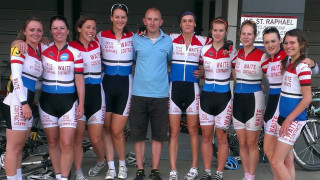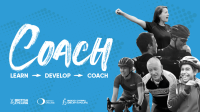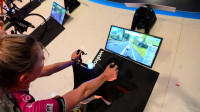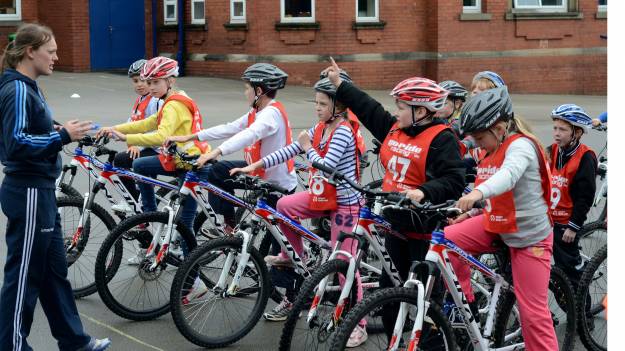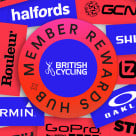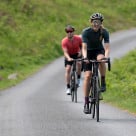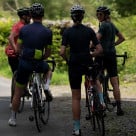Alan Sheldon is a stalwart of the sport, being a British Cycling Level 2 coach, a national track commissaire and an assistant road commisaire. He’s currently undertaking his Level 2 Track Award.
Coaching and Education Officer Andy Kirkland spoke to Alan to find out more.
1. Alan, you’re hugely active and much respected in the sport. What’s your background as a rider?
When I was eight years old I won £50 on the Premium Bonds and bought a Raleigh Chopper and rode it everywhere. At 15 I was working in a local bike shop building wheels - a skill my mum taught me. I got a road bike from the shop and started riding with Severn RC. We ‘got the miles in’ on a Sunday and also did technique work in a supermarket car park. I started off doing local time trials, moving on to road and track racing.
I won quite a few races including the regional championships and was selected for GB as a junior. I didn’t get to keep my GB jerseys though, we had to wash them and then post them back after each race. It was a different era with no performance programmes, little sponsorship and very few avenues to progress. I had to make a proper living and drifted away from the sport, but took it up again when I was 36 years old.
2. How did you get into coaching?
I started riding with Manchester Triathlon Club, still on my Holdsworth bike that I raced as a junior. I got my track accreditation in 2004, did structured quality training (SQT) sessions and track league too. I started leading club rides and this is when other riders started to ask me loads of questions about cycling. The club’s head coach suggested that I took my Level 2 Certificate in Coaching Cycling so I sort of drifted into coaching that way.
I also helped out at the track and a local organiser suggested that I do my commisaire training. The rest is history.
3. You’ve been very active in a number of race teams, most specifically female squads. Tell us more.
One of our talented triathlon riders attended the British Cycling female only sessions at Tameside circuit. She impressed the coaches so much she ended up being coached by Great Britain coach Matt Winston. I started training with her on a daily basis and supporting her at races - and I really loved getting back into the race environment. As I was attending most of the women’s series races, VC St Raphael Club asked me if I would like to be one of their Director Sportives (DS) so I ended up supporting a whole team.
4. You’ve been very successful in encouraging female riders into racing, both at regional and national level. What’s your secret?
There’s no secret. It’s as simple as being encouraging, letting riders know what opportunities are open to them and putting them in touch with other riders. I’ve seen the women’s racing scene change substantially over recent years. As DS, I sometimes have to shield the riders from the worst bits but thankfully there are also exceptionally well run races such as the Cheshire Classic for women.
The women are great at supporting each other with social media such as Twitter being very important to them. Coverage of women’s racing in the mainstream media is far from ideal however, but Twitter, Facebook, rider blogs and so on mean that women are now generating their own publicity. This is having a positive effect with there being around 20 new female racing teams in the last year. Sponsors are starting to understand that female teams offer great value for money in terms of exposure. For a reasonable budget a female team can attract a couple of Olympic champions!
Riders such as Lizzie Armistead are true role models and advocates for women’s racing. They’re happy to respond to questions and provide encouragement on Twitter. Katie Archibald has been great too: she’s progressed rapidly from domestic racing to being a Podium athlete. The impact of these women on the sport cannot be underplayed.
Although females have faced many challenges over the years (small fields, old-school mind-sets, having to race with males and lack of support) we’re now moving in the right direction. The women are no longer willing to be treated like second class citizens. The British Cycling structure is certainly helping as there are more and better quality races available. The Sport England This Girl Can initiative is very helpful, too. Women are starting to feel empowered to take a far more active role in the sport and it’s growing as a result.
5. You’re a Director Sportive for VC St Raphael Women’s squad and Team Moda Anon, a male racing team. Do you think coaches need a different approach when working with female riders?
There are certainly key differences between the male and female side of the sport. There’s a greater sense of community at female races where riders encourage and support each other. They’re happy to welcome newcomers to the party and encourage new racers. If riders are reading this and are nervous about racing, go for it!
In terms of working with female riders, those who I work with tend to be driven, intelligent, high achievers with a strong work ethic. I’m asked very specific questions by them i.e. how does this race fit into the overall plan? How does this training work? And so on.
Racing is also a bit different. With the women's team we usually have to travel on the morning of a race, not having the opportunity to pre-ride courses because the budget does not allow us to stay in a hotel overnight.
At Team Moda Anon, we have a DS, a team manager and a mechanic which really helps to share the work load on the race weekend. It’s certainly harder physical work working with the women's team but also highly rewarding.
6. What skills from your commisaire role have you applied to your coaching?
Fulfilling different roles means that I have a great deal of respect for officials and a wider perspective of the sport. Commisaires do a very difficult job juggling the need for open, fair racing and the health and safety of everyone involved.
In terms of coaching, I know the little things that commissares are looking for and I’ll work with riders to ensure they avoid transgressions i.e. holding the correct line and so on.
7. Give us your three top tips for other coaches.
1. It’s amazing to work with groups of women riders. Enjoy what you do and understand that it’s a privilege to be a coach.
2. Be flexible and listen to what riders are telling you. When you respond, be encouraging, supportive and committed.
3. Get out and observe riders training and racing. This information can be fed back into the next training session.

